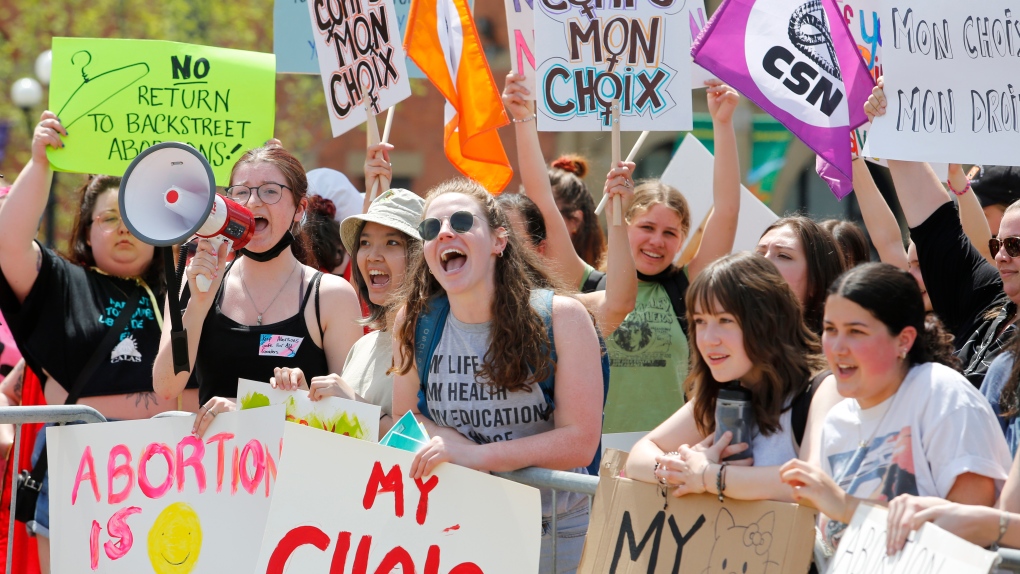
Majority of Canadians support legal protections for abortion, survey finds
 People protest against the March for Life on Parliament Hill in Ottawa on Thursday, May 12, 2022. THE CANADIAN PRESS/ Patrick Doyle
People protest against the March for Life on Parliament Hill in Ottawa on Thursday, May 12, 2022. THE CANADIAN PRESS/ Patrick Doyle
Decades after abortion was decriminalized in Canada, a new survey suggests the majority of citizens think it’s time to codify access in law.
In the final installment of a three-part series exploring the politics of abortion in Canada, the non-profit Angus Reid Institute found 57 per cent of people polled would like to see legislation to protect access to abortion services.
Support for a law enshrining abortion rights grows to 60 per cent in B.C., although the study found seven per cent of people in the province want to see abortion legally restricted. The remaining one-third of British Columbians don’t see legislation as necessary.
Instead of implementing new legislation, some abortion rights advocates argue governments should use the tools they already have to improve access to reproductive health services.
"National reproductive rights groups in Canada do not support a law to enshrine abortion rights, as we believe this could politicize the issue even more, and subject the right to ongoing interference in the future," said Joyce Arthur, executive director of Abortion Rights Coaltion of Canada said.
Respondents in the Angus Reid poll were also asked whether they support political parties banning anti-abortion candidates – a policy adopted by both the federal Liberals and NDP – and were divided down the middle. Men over the age of 34 were the most likely to oppose a ban, while women under the age of 35 were the most likely to support one.
Fifty-six per cent support withholding federal health transfer payments to provinces that don’t provide reliable access to abortion services.
More funding, not less is needed for provinces to expand sexual and reproductive health-care services, including abortion, says Arthur.
“Provincial governments should ensure access in every region so people don’t have to travel, and license midwives to provide medical abortion,” said Arthur, adding that medical schools need to provide more training and opportunities for future abortion providers.
In the first part of the three-part series, Angus Reid found nearly three-in-10 Canadian women experience an unplanned or unwanted pregnancy in their lifetime. For those that had an abortion, 16 per cent say it was difficult or impossible to access.
A 2016 report from the UN Human Rights Commissioner highlighted concerns about disparities in access to abortion services and affordable contraceptives in Canada.
The committee recommended Canada ensure access to legal abortion and affordable contraceptives in all provinces and territories, with an emphasis on helping women and girls in poverty or remote areas.
“Ensure that the invocation of conscientious objection by physicians does not impede women’s access to legal abortion services,” is another recommendation in the report.
While access problems still exist in Canada, Arthur appreciates the progress that’s been made in the past few decades.
“We’ve come a long way with many victories achieved. Dozens of clinics now provide abortion that didn’t exist in 1988, abortion is fully funded almost everywhere, we have the abortion pill, and we’ve successfully fought back every attempt to restrict abortion in law,” Arthur said.
CTVNews.ca Top Stories

'Anything to win': Trudeau says as Poilievre defends meeting protesters
Prime Minister Justin Trudeau is accusing Conservative Leader Pierre Poilievre of welcoming 'the support of conspiracy theorists and extremists,' after the Conservative leader was photographed meeting with protesters, which his office has defended.
What is changing about Canada's capital gains tax and how does it impact me?
The federal government's proposed change to capital gains taxation is expected to increase taxes on investments and mainly affect wealthy Canadians and businesses. Here's what you need to know about the move.
'My stomach dropped': Winnipeg man speaks out after being criminally harassed following single online date
A Winnipeg man said a single date gone wrong led to years of criminal harassment, false arrests, stress and depression.
Bank of Canada officials split on when to start cutting interest rates
Members of the Bank of Canada's governing council were split on how long the central bank should wait before it starts cutting interest rates when they met earlier this month.
Pilot reported fire onboard plane carrying fuel, attempted to return to Fairbanks just before crash
One of the two pilots aboard an airplane carrying fuel reported there was a fire on the airplane shortly before it crashed and burned outside Fairbanks, killing both people on board, a federal aviation official said Wednesday.
'One of the single most terrifying things ever': Ontario couple among passengers on sinking tour boat in Dominican Republic
A Toronto couple are speaking out about their 'extremely dangerous' experience on board a sinking tour boat in the Dominican Republic last week.
Quebec nurse had to clean up after husband's death in Montreal hospital
On a night she should have been mourning, a nurse from Quebec's Laurentians region says she was forced to clean up her husband after he died at a hospital in Montreal.
7 surveillance videos linked to extortions of South Asian home builders in Edmonton released
The Edmonton Police Service has released a number of surveillance videos related to a series of extortion cases in the city now dubbed 'Project Gaslight.'
Ukraine uses long-range missiles secretly provided by U.S. to hit Russian-held areas, officials say
Ukraine for the first time has begun using long-range ballistic missiles provided secretly by the United States, bombing a Russian military airfield in Crimea last week and Russian forces in another occupied area overnight, American officials said Wednesday.






























